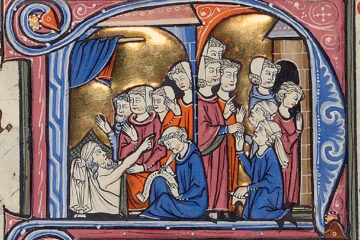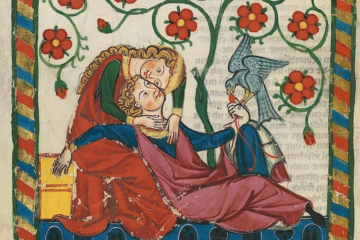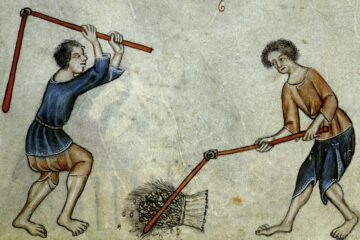Modeled after the Roman legions and used as a tool of defense and prestige throughout the age of the Empire, the Imperial Army outgrew its original purpose and became more of a liability than a blessing, especially during the formative years of the Kingdom of France.
The First Imperial Uprising (1134)
A dog respects its master as long as he provides good meat and water to it. Replace order with chaos, and all of a sudden the dog bites the hand which feeds it. Following the defeat at the Battle of Buhl, the Imperial Army was shattered for the first time, mainly due to the logistical fallacy of it not being ready for an opposing army comprised out of a large percentage of cavalry. That, and Emperor Philip I‘s untimely death at the battle, likely scared the Imperial Officers, who were all noblemen as of Philip’s recent reforms which abandoned Lord Marshal Argonon’s attempts to promote men based on valor and merit.
Nevertheless, a detachment of the Imperial Army, around a fifth of the entire remaining fighting force, retreated to southern Frankia, to the Aqvintian provinces and laid siege to many a settlement, in a desperate attempt to carve out countries of their own during this time of turmoil. Unfortunately for them, Torrino II‘s ascension was swift and powerful. He did not break, but in fact, rose to the occasion and became one of the greatest rulers in France’s history. By 1136, the First Imperial Uprising was quelled and the traitors were tried for treason. Torrino II’s decision to punish instead of show mercy was widely regarded as fair and just, but one can only wonder if it further alienated the Imperial caste and made them worry for their fate once the war came to an end.
The Second Imperial Uprising (1156)
As said before, a hungry dog is a friend to no man. The war had been raging for quite some time now. And truth be told, the Imperial Army was draining the treasury even during peacetime, let alone while it was operating at its maximum capacity during a prolonged war. The Emperor simply didn’t have enough coin for the entire army to be paid well. The lack of funding meant that the men weren’t getting their paychecks, proper equipment or compensation for their families were they to die on the field. This outrage came to a head in 1156 when an entire Secondary rebelled and seized the Kingdom of Deston from the Roswaldas and declared an independent state. Torrino II wasted no time, especially with rumors of a German army approaching soon, and dealt with the rebels swiftly within the year.
The impact of the Second Uprising is debated to this day. While some chalk it up as “one in a long line of many” others place critical importance upon its role in the Fifty Years’ War. Seeing as it took place only one year before the Battle of Rosewood, scholars conclude that the setbacks, lost men and resources, as well as the general strain from fighting a revolt, played a huge part in the Empire’s most shameful and detrimental defeat, which was only the first loss in a huge string which eventually led to its downfall.
The Third Imperial Uprising (1158)
Si in Urbem incidit, Imperii moritur.
Old saying which was on the Old Walls before they were destroyed. It reads: “If the City falls, the Empire dies.”
The Third Imperial Uprising was the most successful of the bunch. In fact, it resulted in the formation of multiple counties in 1158 through 1160, where former Imperial Officers overthrew the local rulers and declared themselves Counts. This was of course due to the fact that they had a loyal army beneath them. In a way, it mirrors the folly of Rome and how their legions turned on them.
Once the Emperor died and was succeeded by his son, Charles “the Bold”, the Imperial Officers found the perfect opportunity. Their forces were small enough to not warrant a large response but large enough to fight off renegade German warlords as well as the local nobility. As such, they quickly carved up the now burning Carolingian Empire, especially the parts furthest away from Rosewood.
The Fourth Imperial Uprising (1206)
The Treaty of Bern ended hostilities between the Kaiser and the King of France. Though, it left much unsaid regarding the dozen German warlords in the kingdom and the handful of Imperial Counties which formed after the Fall of Rosewood. King Philip spent the rest of his reign, until 1180 fighting these warlords and self-proclaimed counts in an attempt to unify what Kingdom he had left. In the end, he was successful and France was restored to her previous borders more or less. The King was wiser than his predecessors and decided to spend the rest of his reign rebuilding and restoring instead of warring. The unfortunate part is that he would die two years later and be succeeded by his son, Charles II, better known as “the Conqueror.” The title given to him doesn’t bode well for Western Frankia and her rulers.
Immediately upon his ascension, he proceeded to begin a large campaign to vassalize and occupy as much rightful land as he possibly could. As per the Treaty of Bern, he was named overlord of all of Western Frankia, giving his family an indisputable claim to the entire region west of the Holy Roman Empire.
By King Philip II’s decree, the Imperial Army was defunded and close to extinction. However, King Charles II revived it in order to use it as a tool in his conquests. It worked out after all and Charles managed to expand France to its current borders. This came at a price, however. One I feel the King would not pay had he known about it. On the 1st of March 1206, at the CXIX Grand Tourney, the King was ambushed by Imperial Officers who took his life. The Imperial Army stationed in Rosewood attempted a coup d’état, to install themselves as the leaders of France. The Armies of the Rodomir and Winter household came to the Royal Household’s rescue and managed to restore order in Rosewood. Until 1208, the people of Rosewood and its county lived under direct Imperial Rule, and the Royal Family, consisting of the Heiress, Lady Elanor Sirius, her Prince-Consort, Lord Jacques Armington, and their seven-year-old son Prince Torrino Sirius, were housed in Alparis between 1206 and 1208. Upon their return, the Winter and Rodomir Households were deemed the winners of the Grand Tourney for the previous three years and given generous rewards. Lady Elanor of France became the First Queen of France. In 1210, she abolished the Imperial Army in its entirety:
In Nomine Patris et Filii et Spiritus Sancti,
We, Lady Elanor, first of our name, of the Royal House Sirius, Queen of France by the good grace of our Lord God, do hereby disband the Imperial Army set up by our great-great-grandfather, Emperor Torrino “the Founder”. All men who bear the blue stripes of the Imperial Army are hereby instructed by Royal Decree of the House Sirius, to abandon their posts and return to their homes of origin. Their ranks are relinquished and all of their pays and privileges are revoked. All Imperial Deserters and Dissidents are pardoned of their previous crimes on the condition that they renounce their Imperial Heritage. Those who continue to bear the Imperial Stripes and call themselves “Soldiers of the Imperial Army” are hereby outlawed and considered traitors to the Queen of France, and the Kingdom of France.
All local lords are instructed to carry out the Royal Household’s will and oversee the disillusion of their respective Imperial Regiments. Additionally, all local lords are hereby instructed to assume complete control of the Imperial Watch, and add it to their levy, for any purpose they see fit, although that purpose should be the organization of local defenses against outlaws and other lords. The Crown will not bear the responsibility of protecting its smallest vassals. That task falls on the lords themselves.
Let it then be known, that the Imperial Army has been found guilty of high treason and all of the highest officers will be put on trial before the Crown in Rosewood. Furthermore, the Imperial Watch has been disbanded and reorganized into individual Guards and Watches across France.
Signed:
Dated 1210, bearing the Royal Sirius Seal, distributed to all the cities and towns within France. This specific parchment was uncovered in 1215 in Shelby.
-Lady Elanor Sirius, Queen of France


